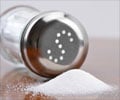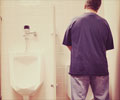Cutting down the intake of salt in older adults reduces the excessive need to urinate during the night.
Highlights
- Simply cutting back on salt intake can reduce night-time trips to the toilet.
- Salt can only be disposed from the body when it is dissolved, so the more people eat, the more urine needs to be expelled to get rid of it.
- Those who reduced salt intake to 8gms per day could cut down the number of trips to the toilet to 1.4 times from 2.3 times.
Low or No Salt Can Do The Trick
The new study presented at the European Society of Urology Congress in London suggests that a slight dietary tweak can help tackle the problem.
A study of 321 men and women examined the association between salt intake and frequency of urination. The patients were given guidance and support to reduce salt consumption. They were followed for 12 weeks, and salt consumption measured biochemically.
The results showed that reducing daily salt intake to eight grams reduced the number of times participants needed to urinate, from 2.3 times a night to 1.4 times.
"Research generally focuses on reducing the amount of water a patient drinks, and the salt intake generally is not considered. Here we have a useful study showing how we need to consider all influences to get the best chance of improving the symptom," said Dr Matsuo Tomohiro from Nagasaki University.
Bottom line
"Night-time urination is a real problem for many people, especially as they get older. This work holds out the possibility that a simple dietary modification might significantly improve the quality of life for many people," said lead researcher Matsuo Tomohiro from Nagasaki University in Japan.
Salt can only be disposed from the body when it is dissolved, so the more people eat, the more urine needs to be expelled to get rid of it.
"This is the first study to measure how salt intake affects the frequency of going to the bathroom, so we need to confirm the work with larger studies," Tomohiro said.
Source-Medindia













